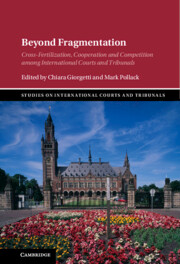 Beyond Fragmentation
Beyond Fragmentation Published online by Cambridge University Press: 28 April 2022
This chapter argues there is a “pull” toward cross-fertilization on procedural questions, meaning cross-fertilization between international courts and tribunals may be more likely for procedural issues than in substantive law. It describes cross-fertilization in relation to procedural issues. Procedural cross-fertilization is a process and is not just about borrowing by adjudicators, but involves contributions by a range of actors. Three considerations facilitate procedural cross-fertilization and even make it somewhat likely: the discretion of adjudicators on procedural issues, adjudicators’ duty to decide numerous procedural issues, and sociological considerations concerning the circulation of a small number of personnel across multiple fora. However, two considerations counterbalance adjudicators’ broad discretion. On one hand, control mechanisms operated by states push adjudicators to remain faithful to their mandates, limiting the space for procedural cross-fertilization. On the other hand, procedural cross-fertilization feeds and is fed by an emerging model of international due process that is affecting all areas of international adjudication.
To save this book to your Kindle, first ensure [email protected] is added to your Approved Personal Document E-mail List under your Personal Document Settings on the Manage Your Content and Devices page of your Amazon account. Then enter the ‘name’ part of your Kindle email address below. Find out more about saving to your Kindle.
Note you can select to save to either the @free.kindle.com or @kindle.com variations. ‘@free.kindle.com’ emails are free but can only be saved to your device when it is connected to wi-fi. ‘@kindle.com’ emails can be delivered even when you are not connected to wi-fi, but note that service fees apply.
Find out more about the Kindle Personal Document Service.
To save content items to your account, please confirm that you agree to abide by our usage policies. If this is the first time you use this feature, you will be asked to authorise Cambridge Core to connect with your account. Find out more about saving content to Dropbox.
To save content items to your account, please confirm that you agree to abide by our usage policies. If this is the first time you use this feature, you will be asked to authorise Cambridge Core to connect with your account. Find out more about saving content to Google Drive.